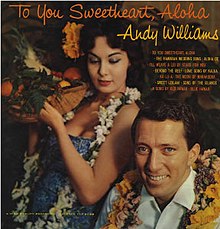| To You Sweetheart, Aloha | ||||
|---|---|---|---|---|
 | ||||
| Studio album by | ||||
| Released | 1959 | |||
| Recorded | November 3, 1958 November 7, 1958 April 29, 1959 April 30, 1959 May 4, 1959[1] | |||
| Genre |
| |||
| Length | 27:59 | |||
| Label | Cadence Records | |||
| Andy Williams chronology | ||||
| ||||
| Review scores | |
|---|---|
| Source | Rating |
| Allmusic | |
| Billboard | |
| The Encyclopedia of Popular Music | |
To You Sweetheart, Aloha is the fourth studio album by American pop singer Andy Williams and was released late in the summer of 1959 by Cadence Records.[3] This, his fourth LP for the label, has a Hawaiian theme that coincides with the admission of the 50th of the United States.
One of the songs on this album, "Hawaiian Wedding Song", was originally recorded and released as a single in 1958 and stayed on the pop chart for 20 weeks, peaking at number 11.[5] It was included on his last album, Two Time Winners, as were two other songs from this album, "Blue Hawaii" and "Sweet Leilani". Both of those songs, however, were rerecorded for this album while the hit single was not.
The album was reissued with the title The Hawaiian Wedding Song in 1965 by Columbia Records and entered the Top LP's chart in Billboard magazine's May 22 issue that year and reached number 61 during its 18 weeks there.[6]
To You Sweetheart, Aloha was released on compact disc for the first time as one of two albums on one CD by Collectables Records on September 12, 2000, the other album being a 1962 Cadence compilation entitled Million Seller Songs.[7] Collectables included this CD in a box set entitled Classic Album Collection, Vol. 1, which contains 17 of his studio albums and three compilations and was released on June 26, 2001.[8] This album was also released on compact disc with four bonus tracks after being digitally remastered by Varèse Sarabande in 2001.[9] Three of those four ("Blue Hawaii", "Sweet Leilani", and "Love Letters in the Sand") were recorded for the Two Time Winners album, and the fourth ("House of Bamboo") was the B-side of "Hawaiian Wedding Song".[10]
- ^ "The Cadence Era: "Canadian Sunset" brightens Andy's disk career". Billboard. 1967-11-11. pp. AW-22.
- ^ a b "To You Sweetheart, Aloha – Andy Williams". allmusic.com. Rovi Corporation. Retrieved 11 June 2011.
- ^ a b "Reviews of This Week's LP's". Billboard. 1959-09-14. p. 44.
- ^ Larkin, Colin (2007). The Encyclopedia of Popular Music. Omnibus Press. p. 1498. ISBN 9781846098567. Retrieved 22 August 2024.
- ^ Whitburn 2009, p. 1059.
- ^ Whitburn 2010, p. 844.
- ^ "Million Seller Songs/To You Sweetheart, Aloha — Andy Williams". allmusic.com. Rovi Corporation. Retrieved 11 June 2011.
- ^ "Classic Album Collection, Vol. 1 - Andy Williams". allmusic.com. Rovi Corporation. Retrieved 6 May 2011.
- ^ "To You Sweetheart, Aloha (Bonus Tracks) - Andy Williams". allmusic.com. Rovi Corporation. Retrieved 11 June 2011.
- ^ (2001) Album reissue notes for To You Sweetheart, Aloha by Andy Williams [CD booklet]. Studio City: Varèse Sarabande.